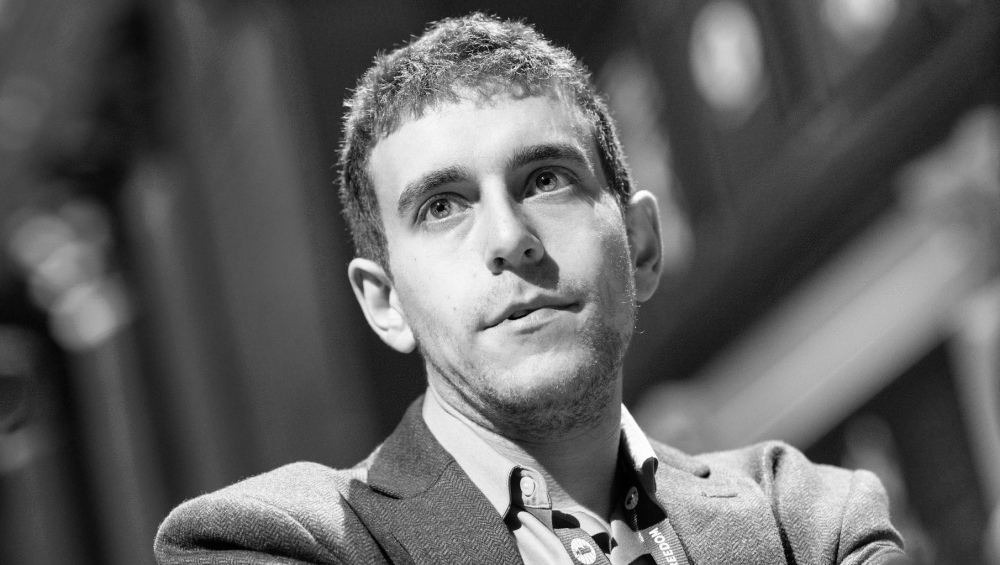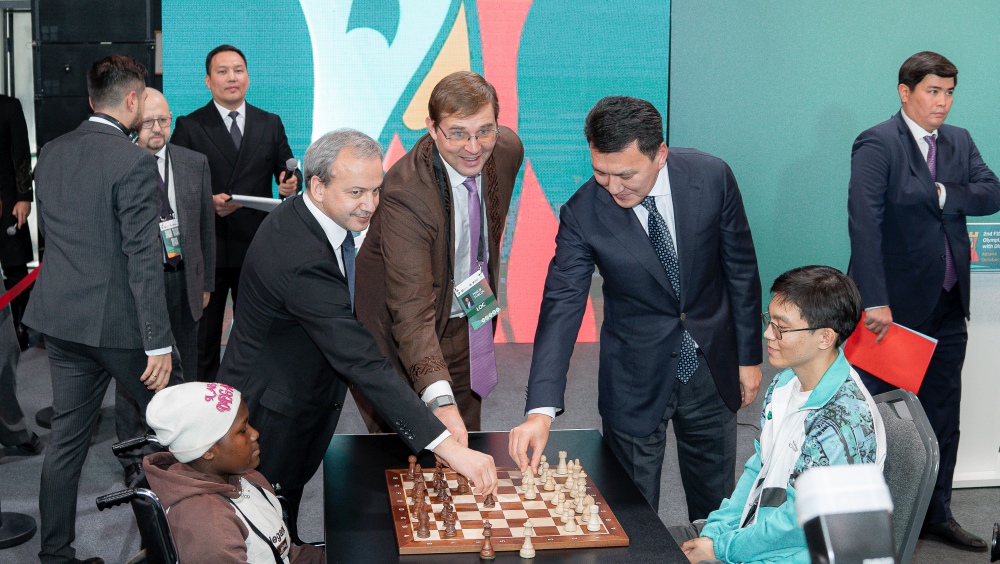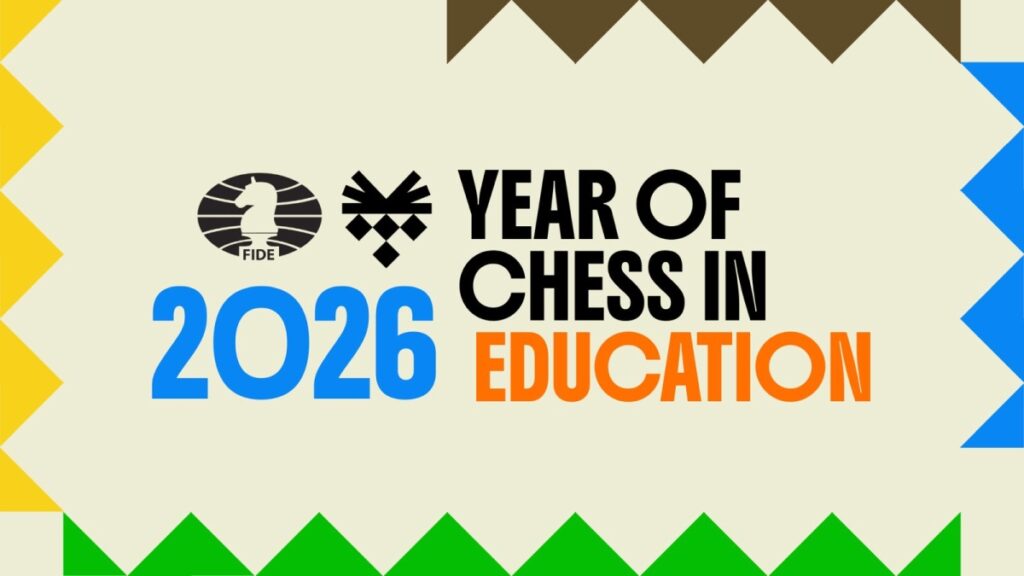Daniel Naroditsky (1995–2025)

Born on 9 November 1995 in San Mateo, California, Daniel Naroditsky became a prominent Grandmaster, author, coach and streamer whose influence extended far beyond the chessboard. He died just two weeks before his 30th birthday. Chess entered his life at the age of six, when his older brother, Alan, brought several board games to entertain children at a party. Their father, Vladimir, an immigrant from Ukraine, taught them how to play chess. “I think a lot of people want to imagine that it was love at first sight and that my brother couldn’t pull me away from the chessboard… It was more of a gradual process, where chess slowly entered the battery of stuff we did to pass the time. A lot of my best memories are just doing stuff with my brother,” he told the New York Times in 2022, in an article announcing that he would be writing a chess column for the paper. Beyond chess, basketball was another of Naroditsky’s favorite sports. Like most players destined for success, Daniel Naroditsky began making his mark early. In 2007, he earned the FIDE Master title and won the U-12 section of the World Youth Chess Championship. He shared second place at the 2010 US Open, became an International Master in 2011, and won the US Junior Championship in 2013. That same year, he achieved the title of Grandmaster. His peak FIDE classical rating was 2647, reached in May 2017. Naroditsky was also an exceptional blitz and rapid player. He competed in major national and international events while simultaneously making a path for himself outside of chess, graduating with a degree in history from Stanford University. But Naroditsky’s greatest gift to chess was his ability to explain the game to those who were just starting to discover Caissa’s world. He was a teacher at the Charlotte Chess Center, and also had private students. He authored several books on chess, starting with Mastering Positional Chess which he published at the age of 14 – having begun writing it when he was just ten years old. Naroditsky often appeared as a commentator for prominent chess events, most notably on Chess.com, and also ran highly popular Twitch and YouTube channels. He was praised for the ability to calmly and simply explain the game to players of all levels. From 2014 to 2020 he also wrote a column for Chess Life. Naroditsky’s unexpected passing was announced on X by his family via the Charlotte Chess Centre. Chess players around the world spoke out following the news of Naroditsky’s death, praising him as a skilled player, a gifted educator and a generous spirit. Beyond the chessboard, Naroditsky played a pivotal role in popularizing chess content online, bridging the gap between professional and amateur chess. Speaking to the New York Times in 2022, he summed up his view of chess – and life – in the following well-known quote: “At the end of the game, both the king and the pawn go into the same box.” There are not many people in the world who manage to achieve so much before turning 30. Grandmaster Daniel Naroditsky will forever be among them. Written by Milan Dinic Photos: Maria Emelianova, Lennart Ootes and Michal Walusza
FIDE Olympiad for People with Disabilities, Day 1: A celebration of inclusivity and determination

The 2nd FIDE Olympiad for People with Disabilities officially began in Astana, Kazakhstan, bringing together 34 teams from 29 countries. Additionally, eight more nations are represented through the teams of the IPCA (International Physically Disabled Chess Association), IBCA (International Blind Chess Association), and ICCD (International Committee of Silent Chess) — making it a truly global event, with participants from 37 countries in total. The games are hosted at the Paralympic Training Centre, one of the most advanced and accessible sports facilities in Central Asia. With two spacious playing halls, the venue offers perfect and comfortable conditions for all participants, reflecting the Olympiad’s core message of inclusion and equal opportunity. Opening ceremony The opening ceremony was held in a warm and inspiring atmosphere, attended by dignitaries, players, and guests who celebrated the start of this unique event. In the main playing hall, the first ceremonial move was made by Erlan Karin, State Counsellor of the Republic of Kazakhstan; Arkady Dvorkovich, President of FIDE; and Timur Turlov, President of the Kazakhstan Chess Federation. Timur Turlov spoke about the significance of this Olympiad, saying: “Chess is a great symbol of equality and an opportunity to play across the globe. Having differences doesn’t change that – chess unites.” In the second playing hall, the first move was performed by Baglana Musina, President of the Corporate Fund Freedom Shapagat; Oscar Santana Leon, Ambassador of Cuba; and Dmitriy Balandin, Olympic Swimming Champion. FIDE President Arkady Dvorkovich emphasized the importance of inclusivity in chess, noting that this Olympiad stands as a model of equal opportunity: “Chess is inclusive, and we must ensure that everyone has access to top events. The Olympiad for People with Disabilities proves that we are creating those opportunities for all.” He also highlighted FIDE’s broader commitment to social initiatives around the world: “Through projects like Chess for Refugees, Chess for Freedom, and Chess for Children with Autism, we’re showing that chess is truly for everyone. This Olympiad is our flagship event – a reminder that chess is accessible and brings happiness to all who play it.” Voices of the 2nd Olympiad for People with Disabilities The Olympiad is not only about the results – it’s about people and their stories. Every participant brings a story of resilience, courage, and passion for the game. Shantel Panashe Gweshe from Zimbabwe, a social worker and first-time Olympiad participant, shared her experience: “It’s my first time coming all the way from Zimbabwe, participating in this Olympiad. What I have seen here – there’s so much inclusivity for people living with disabilities. When I go back to Zimbabwe, the first thing I’m going to do is empower other people with disabilities to ensure inclusivity and participation.” Meanwhile, Henry Lopez from the Philippines (pictured above), who won a bronze medal at the first Olympiad in Serbia in 2023, reflected on how deeply chess has shaped his life: “Chess for me now is my source of living. I am a national team player in the Philippines, and I receive a stipend from the government. Chess is a universal language – it’s a great equalizer. No matter how old or young you are, or whether you have a disability, you can play. Chess is for everybody.” With determination in his voice, Henry added: “At the previous Olympiad, we got third – this time, frankly speaking, we are aiming for number one.” This is what the FIDE Olympiad for People with Disabilities is truly about – gathering players from all around the world, giving them opportunities to show the power of their minds, and celebrating the unifying strength of chess. Games and results The first round brought exciting games and strong performances by the top teams. Almost all favorites won their matches convincingly. Uzbekistan, India, Venezuela, and FIDE 1 began their campaigns with impressive 4–0 victories. There were, however, two notable ties: North Macedonia held the Czech Republic to a 2–2 draw, and ICCD (International Committee of Silent Chess) also drew with Argentina. You can find all results, pairings, and standings after the first round on Chess-Results: s3.chess-results.com/tnr1276749.aspx?lan=1&art=0&rd=1&SNode=S0 Side events in Astana In addition to the competition, today featured two important milestones for the global chess community. A Memorandum on Declaring 2026 the Year of Chess in Education was signed between FIDE President Arkady Dvorkovich and President of the International School Chess Federation Timur Turlov, who also leads the Kazakhstan Chess Federation. Following the signing, Timur Turlov said: “I hope that it will help a lot of kids to discover themselves better – to train their ability for strategic thinking, to keep concentration, to build clubs, and to make friends across the globe.” FIDE President Arkady Dvorkovich highlighted that this initiative aims to significantly expand chess participation among young people: “Our goal is to double the number of children playing chess worldwide, and our partnership with the International School Chess Federation will help us make that a reality.” Another memorandum was signed between Turkey, Kazakhstan, Uzbekistan, Turkmenistan, and Kyrgyzstan, establishing an Association of Turkic-Speaking Countries. This new initiative aims to bring the work of these nations closer together, strengthening cooperation in chess development and the organization of joint events. A celebration of unity and inclusion The first day of the 2nd FIDE Olympiad for People with Disabilities set the tone for a remarkable event – one that celebrates not only competitive excellence, but also the human values of inclusion, equality, and respect. The Paralympic Training Centre in Astana has become a home for players from all corners of the world, united by one timeless truth: chess is for everyone. Official website: dis-olympiad2025.fide.com/
Arkady Dvorkovich’s interview for ChessBase India

The FIDE President discussed the Total Chess World Championship Tour, changes to the 400-point Rating rule, the success of the Year of Social Chess, and the state of FIDE. In an online interview with Sagar Shah of ChessBase India, one of the leading chess media outlets, Arkady Dvorkovich highlighted the importance and the role of the new Total Chess World Championship Tour which was recently announced by FIDE. “FIDE has for a long time been thinking about a new format where we can combine different time controls and adjust to the reality of the faster, digital world, but also reflect the existing high interest in classical and blitz chess. We were happy that Norway Chess came up with the initiative to do something like that. It was the right time, the right moment and the right partners. From the very beginning, we had a clear understanding that we can do it only together,” Dvorkovich said. “We do believe this [project] will bring many new spectators and excitement to the players. Most of the top players believe that it is a very interesting format”. Dvorkovich emphasized FIDE’s position that the classical world championship title “is the most important one… but we believe it is the right time to increase the importance of other formats as well”. The new partnership with Norway Chess is a long-term commitment, based on an eight-year contract with an option to renew for an extended period. “I do believe that – based on the concept that we have – it will be at least equally important as Rapid and Blitz, but potentially much bigger,” Dvorkovich added. On the subject of how the rising number of global chess events in a year has an impact on the annual chess calendar, Dvorkovich said that “in an ideal world, we should have agreements with all top events and – like in tennis – put them in a universal tour where every top event will count, but that’s not easy”. The FIDE President expressed a commitment to working with all partners to achieve a future ‘universal tour,’ similar to tennis, where every top event counts, and where a consensus on time control, aligned with the exciting World Cup format, can be reached. Chess in India “India is the motherland of chess, and everyone respects that. We always have at least one major event every year in India,” said Dvorkovich. When asked about the forthcoming World Cup in Goa – one of the longest events planned for this year, lasting nearly four weeks – the President of FIDE expressed his confidence in the All India Chess Federation and the local organisers, saying that progress [on organising this event] is made every day, adding that FIDE has “trust that everything will be fine”. Another major event towards the end of the year is the Tech Mahindra Global Chess League, which FIDE has a stake in. The event will take place in Mumbai in December. The media-friendly concept of the event has put a new spotlight on chess globally, and Dvorkovich expressed his support for the project, noting that it has become commercially sustainable. Photo: Aditya Sur Roy “I think it’s good that two big events are in India [this year]. Doha is also not far away, so it’s convenient [for those players participating in the World Rapid and Blitz at the end of the year]”. A more competitive approach to wild cards In recent years, FIDE has refined its approach to the use of ‘wild cards‘ – special invites that ensure the participation of both talented up-and-coming players and chess legends in top world events. “We always give chances to very young players because we can see their potential. This way, we are showing we are aware of the fast growth of these players. Also, we have it as a rule that we give wild cards to veterans”. The FIDE President noted that the approach to issuing the special invites has evolved. “We started using a competitive approach for wild cards, telling players that they can play against each other” to determine who will qualify. No “farming of rating” to be allowed Speaking about the recent targeted amendments to the FIDE Rating Regulations, Dvorkovich said that the organisation does “not allow farming of rating” by top players playing against significantly lower-rated opponents. Acknowledging that such a matchup is possible in an open event or an Olympiad, Dvorkovich noted that “many games like that” clearly suggest “it’s artificial”. “I think we found a good solution,” said Dvorkovich, noting that the goal of the change was never to prevent any player from qualifying for the Candidates. On the subject of FIDE rating in general, including in relation to the question of ratings of inactive players, Dvorkovich acknowledged that it is an “extremely difficult” complex system, with opinion polls and discussions showing a deep split in the chess community about any changes. “When we ask players, normally there is no consensus at all. But most players are not happy about keeping inactive ratings in the system. People do want ratings to reflect the real strength of players,” Dvorkovich said. From the Year of Social Chess to the Year of Chess in Education The interview also touched on the social initiatives, which have become one of the key tools in FIDE’s approach to engage the broader, non-professional, chess audience. “We showed the whole world that chess is a combination of a professional and a social mission to improve society”. Noting that the Year of Social Chess helped “many governments in the world see the social value of chess,” leading to them starting to provide more support for the game not just on a competitive basis but as a tool for social engagement and levelling. “Here we are not talking about medals but [about] society. From this perspective, the year was successful. It doesn’t mean we will finish those projects on the 31st of December – we will continue them. For next year, there is already an
FIDE and ISCF declare 2026 as the Year of Chess in Education

Following the Year of Social Chess, 2026 will be dedicated to chess in education, underscoring FIDE’s focus on integrating chess into the global school curricula worldwide. On 20 October, at NGS School in Astana, FIDE and the International School Chess Federation (ISCF) signed a Memorandum of Cooperation to jointly promote scholastic chess globally. The initiative builds upon the successful 2025 Year of Social Chess and aligns with FIDE President Arkady Dvorkovich’s proposal – made at the recent Smart Moves Summit in Washington, D.C. –to make education one of key focus areas for 2026. Under the agreement – which will guide future cooperation – ISCF will work closely with FIDE to organise a series of international school team tournaments under the name “World Schools Team Championship League 2026” (WSTCL), which will serve as a flagship event of the “Chess in Education 2026” programme. The tournaments will unfold in two stages: Continental Championships for Africa, the Americas, Asia and Europe. Grand Final featuring the winners of respective Continental Championships. The parties expressed their intent to draft an action plan for additional events alongside each WSTCL 2026 tournament, aiming to expand scholastic chess and promote chess as an educational tool. The memorandum was signed by FIDE President Arkady Dvorkovich and Timur Turlov, President of the International School Chess Federation. “Education is the foundation for a good and successful life, and chess is a proven and powerful tool to underpin that goal,” said FIDE President Arkady Dvorkovich. “Investment in chess education, youth and school events has been one of the goals of my team since taking the helm of FIDE. I am delighted that after a successful Year of Social Chess, we are continuing with the Year of Chess in Education, launching new projects and initiatives and getting more schools and educational facilities involved in chess.” The memorandum will serve as a foundation for implementing initiatives aimed at developing school chess and popularising intellectual sports in school education. “Inclusion and equal opportunities have always been close to my heart. With the backing of our Freedom Shapagat Foundation, we have consistently supported social initiatives that help children and promote a more compassionate and humane society. That is why hosting these initiatives within the framework of the FIDE Olympiad for People with Disabilities feels especially meaningful,” said Timur Turlov. “It is only natural that in this year — declared by FIDE as the Year of Social Chess — together with the International School Chess Federation, we take the next step and announce 2026 as the Year of Chess in Education. From early childhood, it is through learning that we build a society grounded in respect, empathy, and support for every child,” he added. The “Chess in Education 2026” initiative marks a major milestone in FIDE’s global efforts to promote chess as a valuable component of learning, supporting both cognitive and social development among students worldwide. About ISCF: The International School Chess Federation (ISCF) is dedicated to the global promotion and integration of chess within the educational system globally. Launched in September 2024 as a FIDE-affiliated organization, the ISCF operates as a main institutional platform for advancing chess in schools — developing educational programs, supporting national federations, and fostering cognitive and social growth among students through the game of chess.

